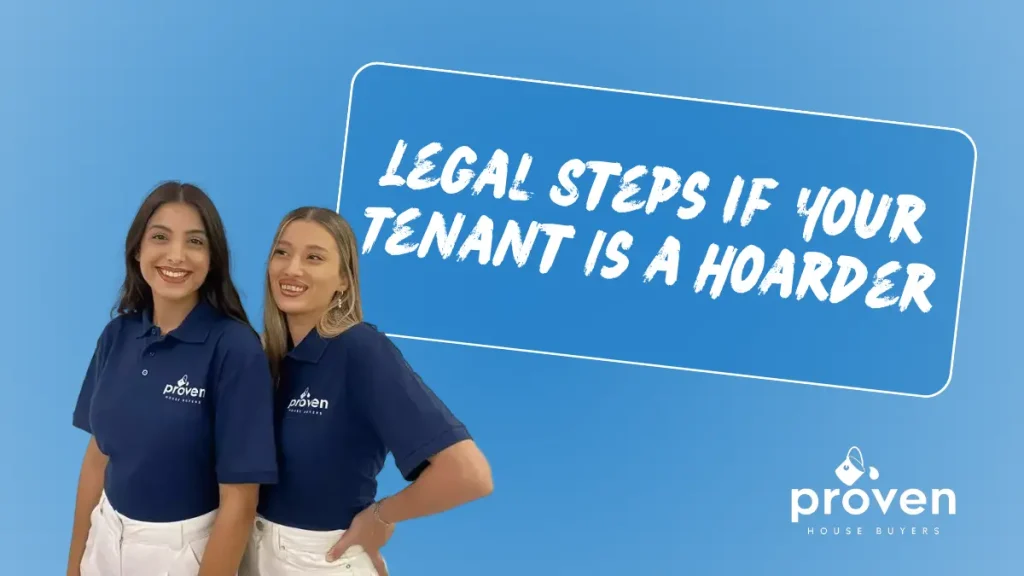Legal Steps if Your Tenant Is a Hoarder in Lakewood
Finding out a tenant is hoarding is one of those situations you never expect to deal with as a landlord. Maybe a neighbor called about smells or pests. Maybe maintenance couldn’t get into a bedroom because the door doesn’t even open. Whatever tipped you off, you’re probably feeling a mix of worry, frustration, and “okay… what do I do now?”
Take a breath. You’ve got options, and you don’t have to choose between risking the property and risking a lawsuit. Let’s walk through the practical, legal next steps in Lakewood, Ohio.
Start with safety and documentation in Lakewood
Your first priority is health and safety. If blocked exits, exposed wiring, mold, or pest activity make the unit hazardous, you need to act. Don’t touch or remove the tenant’s belongings yourself. Instead, document what you see. dates, photos, and a short description of what’s unsafe. This isn’t about shaming anyone. It’s about keeping a clear record so the path forward is based on facts, not feelings.
If access is limited, note that too. You’re building a simple timeline: what you noticed, when you noticed it, and why it matters for safety and habitability in Lakewood.
Open a respectful line of communication with your Lakewood tenant
A quick, judgment-free conversation can go a long way. Let the tenant know what you observed and why it’s a safety issue. Keep it focused on hazards, not housekeeping preferences. You’re not trying to win an argument, you’re trying to help them bring the home back to a safe, livable condition.
This is also a good time to look at your lease. Most leases in Lakewood prohibit unsafe conditions, blockages, and nuisance activity (Chapter 3707). Refer to the relevant clause when you talk to the tenant. It keeps the conversation grounded in the agreement you both signed.
Put your concerns in writing, clearly and kindly
Verbal conversations are great; written notices keep things on track. Send a dated, written notice that explains:
what hazards exist (for example, blocked egress, trash that attracts pests, strong odors);
what needs to change (clear exits, remove trash, allow pest treatment, restore essential services like kitchen or bath access);
a reasonable timeline to fix it; and how to schedule access for inspection or service.
Stay practical and neutral. The goal is compliance, not conflict. If the tenant in Lakewood needs help coordinating a dumpster or pest control, offer options. You’re documenting that you’ve given a fair chance to cure the problem.

Be mindful of fair housing and reasonable accommodations in Lakewood
Hoarding can be connected to a disability. That doesn’t mean unsafe conditions are allowed, but it does mean you should be prepared to consider a reasonable accommodation, like extra time or a structured cleanup plan. You’re still protecting the property and other residents; you’re just doing it in a way that respects the Lakewood law and the person living there.
When in doubt, keep the conversation focused on specific hazards and solutions. “Let’s make sure the kitchen and exits are usable, and let’s schedule pest service,” is a lot more effective (and compliant) than labeling the tenant or their behavior.
If the hazards continue, follow the Lakewood legal process, no shortcuts
If the tenant doesn’t cure the violations by your deadline, it’s time to escalate the right way. Do not lock them out, remove doors, shut off utilities, or throw anything away. Self-help can turn a property problem into a legal nightmare.
Instead, take your documentation and talk to a local-Lakewood attorney about the proper notice to use and next steps in Lakewood. You may need to:
issue a lease-violation notice with a specific cure period, and
proceed with an eviction filing if the hazards remain.
Lakewood courts respond best to calm, consistent documentation: notices sent, attempts to work with the tenant, and clear safety issues that weren’t corrected. Keep your paperwork organized and your tone professional.
Plan the cleanup and repairs without touching the tenant’s belongings
Once you regain lawful possession, either because the tenant cured the issues or because the Lakewood court awarded possession. handle cleanup with licensed vendors who understand these situations. Think: junk removal that documents what’s hauled, pest control with follow-up treatments, deep cleaning, and then any repairs to flooring, drywall, or HVAC that were affected by the conditions.
You’ll also want a simple “post-remediation” checklist: clear egress paths, functioning kitchen and bath, no active pest activity, and good ventilation. This helps you re-rent faster and avoid surprises at the next city inspection in Lakewood.
How cash buyers in Lakewood can help (when you want out, fast)
Sometimes the honest truth is you’re done. Maybe this isn’t your only headache unit. Maybe you live out of Lakewood. Maybe your reserves are better spent anywhere but a deep remediation.
This is where a local cash buyer becomes the pressure valve.
A reputable cash buyer in Lakewood will purchase as-is, hoarding history and all. No showings. No repairs. No waiting for a buyer’s lender to approve conditions. If the tenant is still in place and you don’t want to navigate court, you can be upfront about that too, many investors will take on the legal process after closing and factor it into their offer. If you’ve already regained possession but don’t want to fund remediation, they’ll buy it exactly the way it sits and handle everything from dumpsters to pest treatment.
It’s a clean exit: you pick a closing date, you skip commissions and months of carrying costs, and you move on with cash in hand. For some landlords, that’s the smartest, least stressful choice. especially if this isn’t your first tough turn.
FAQs About Legal Steps if Your Tenant Is a Hoarder in Lakewood
How do I know it’s hoarding vs. just being messy?
Messy is inconvenient. Hoarding creates safety or health hazards. blocked exits, unusable kitchens/baths, pest activity, mold, strong odors, or trash that attracts vermin. Focus on the hazards, not the housekeeping.
What should I do first in Lakewood?
Document what you see (dates, short notes, photos if lawful), then talk to the tenant calmly about specific hazards. Keep it judgment-free and stick to safety/lease compliance.
Do I have to give written notice in Lakewood?
Yes. Put it in writing. Describe the hazards, what must change, reasonable deadlines, and how to coordinate access for inspection or services. Keep a copy.
Can I enter to inspect?
Follow your lease and Lakewood entry rules (proper notice, reasonable time). If there’s an emergency (e.g., active fire risk), act accordingly. Otherwise, notice first.
What if hoarding is linked to a disability?
You still can require safe, habitable conditions, but you may need to allow a reasonable accommodation (e.g., extra time or a staged cleanup plan). Keep requests and responses documented.
Can I hire cleaners and throw things out?
Not while the tenant is in possession. Don’t remove belongings, lock the tenant out, or shut off utilities. That’s “self-help” and can create liability in Lakewood. Use notices and the legal process.
What if the tenant refuses access or won’t cooperate?
Note the refusals, resend written notice with clear deadlines, and escalate through the proper legal path in Lakewood if hazards aren’t cured. An attorney can guide the exact notice and filing to use.
Which notice do I use, and how long do I give?
It depends on your lease and the violation. Because notice types and timelines are technical, it’s smart to check with a Lakewood-area landlord-tenant attorney to get this right.
Will a Lakewood court actually evict for hoarding?
Courts in Lakewood look at evidence of ongoing hazards and whether you gave a fair chance to fix them. Organized records (photos, notices, timelines, service attempts) help your case.
Who pays for cleanup after I regain possession?
Post-possession, you can hire licensed vendors for junk removal, pest control, deep cleaning, and repairs. You may be able to charge costs against the security deposit per Lakewood rules and your lease. Document everything.
How do I avoid fair-housing mistakes?
Talk about conditions, not labels. Offer a clear path to cure. Consider reasonable accommodation requests. Keep communications professional, neutral, and documented.
What if other tenants complain about smells or pests?
Take complaints seriously. Your duty is to maintain habitable premises for everyone. Address the source (the hoarding unit) using proper notices and schedule building-wide treatments if needed.
I’m out of time and money, can I just sell?
Yes. If you’re done managing the situation, Lakewood cash buyers will purchase the hoarder house as-is with a noncompliant tenant, after possession, or mid-remediation. You skip repairs, commissions, and delays.
Is this legal advice in Lakewood?
No. It’s general information. Consult a local-Lakewood attorney for notice types, timelines, and court procedure in your exact situation.
Lakewood Landlords & Sellers Love Our Simple Process
We’re fast, committed and easy to work with. You’ll love us too…
Sell a Hoarder House in Lakewood With The Tenants Still Inside.
You can handle a hoarding situation with both firmness and compassion. Document what you see, communicate clearly, offer a reasonable path to fix the hazards, and if it doesn’t get better, use the proper Lakewood legal process. And if you decide you’re ready to be done with the property altogether, a Lakewood cash buyer can give you a fast, dignified exit that doesn’t drain your time or your reserves.




